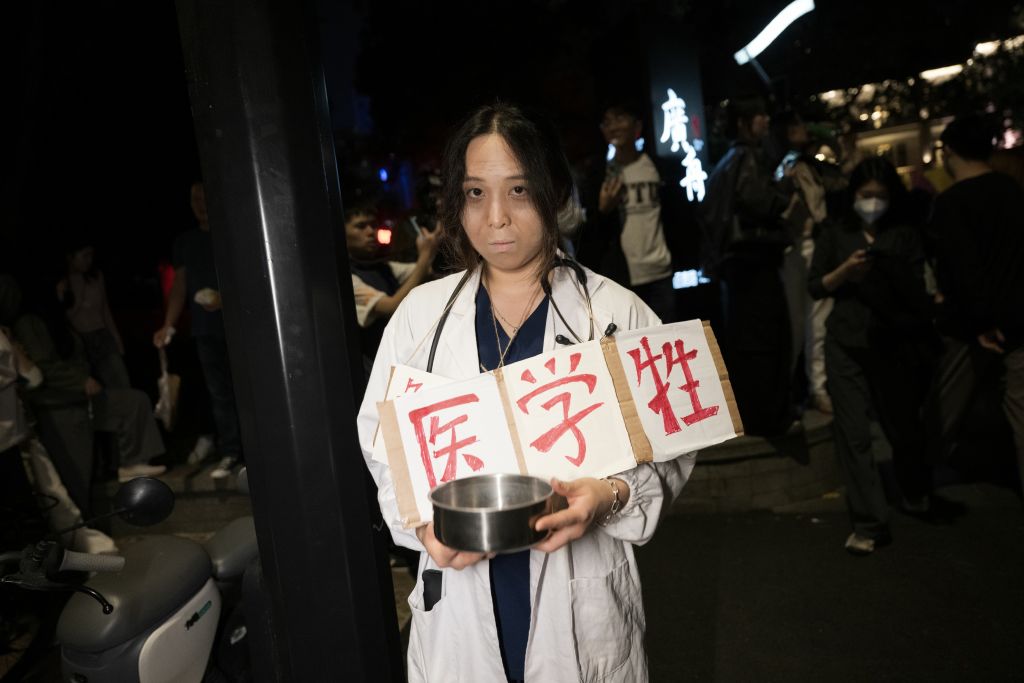
When people gathered in Shanghai at the end of last month for the city’s first big Halloween celebration in years, the parade of costumes—ranging from movie references to local memes and even a few tongue-in-cheek jabs at the government and flailing economy—was initially hailed in state media and on Chinese social media as evidence of “the Chinese public’s cultural confidence and openness” and that “Chinese people live freely without restraint.”
But it was only a matter of time before the crackdown would come. In the last few days, a number of Chinese youth have been detained by police for their political expression at the Halloween parade and Chinese tech companies have been instructed by authorities to rein in cosplay on their platforms, Radio Free Asia reported on Monday, citing several sources.
A number of costume-wearers were detained while others are under investigation, human rights activist Her Peirong told RFA. “I am fairly familiar with these people, and some of their family members have called me,” she said.
The arrests come shortly after Chinese censors reportedly ordered social media sites such as Xiaohongshu and Douyin (the original Chinese version of TikTok) to “rectify” content related to Halloween costumes and ban Halloween posts that “violate the core values of socialism,” an unnamed media company employee told RFA.
Halloween has long been a somewhat touchy subject in China, with authorities previously arguing that scary makeup could cause public panic and others decrying the celebration as an unwelcome Western influence. But this year’s celebration in Shanghai, which comes after three years of pandemic lockdown and almost exactly a year after historic protests broke out over China’s controversial zero-COVID policy, seemed to take on extra political significance for some attendees.
In photos of the parade that garnered significant attention on social media and in the international press, some Halloween revelers sported thinly veiled references to China’s COVID restrictions, such as the white hazmat suits worn by public servants enforcing strict pandemic protocol. At least one person was seen wearing a shirt covered in sheets of blank paper—a prominent symbol used in last year’s protests amid an official crackdown on political slogans. The protests last November, watched closely by the world, were widely considered to be one of the most serious threats to Chinese President Xi Jinping’s grip on power yet. (Authorities notably eased COVID restrictions the following month).
Other halloween costumes this year alluded to frustrations simmering around China’s faltering economy. Multiple parade-goers portrayed university-educated beggars to poke fun at the country’s record-high youth unemployment rate. And a Weibo post from Nov. 1 shows police officers chasing away a man cosplaying as the late Chinese writer Lu Xun, whose story of a struggling scholar in Imperial China has sparked resonance among Chinese youth disillusioned with the narrative that excelling in school is a sure path to financial stability. There was also at least one person dressed as Winnie-the-Pooh, the cartoon bear that has since become a symbol of anti-government sentiment in China—and thus a target of state censorship—because of its apparent physical resemblance to Xi.
“What is up with Shanghai?” Her, the activist, wrote on X. “They’ve just returned from improving diplomatic ties there,” she said, referencing Xi’s rapprochement with U.S. President Joe Biden on the sidelines of the APEC summit in San Francisco last week, “and now they’re arresting people here.”
More Must-Reads from TIME
- Donald Trump Is TIME's 2024 Person of the Year
- Why We Chose Trump as Person of the Year
- Is Intermittent Fasting Good or Bad for You?
- The 100 Must-Read Books of 2024
- The 20 Best Christmas TV Episodes
- Column: If Optimism Feels Ridiculous Now, Try Hope
- The Future of Climate Action Is Trade Policy
- Merle Bombardieri Is Helping People Make the Baby Decision
Contact us at letters@time.com